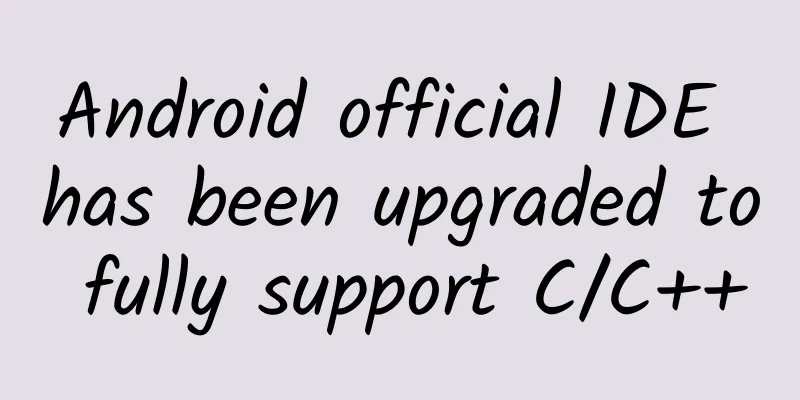Android official IDE has been upgraded to fully support C/C++

|
Google has revealed the next version of Android Studio 1.3 preview, which will not only fully support C language code editing, but also speed up the execution of Gradle automated build tools and add new memory analysis tools. In addition, Google also released the 1.0 of the mobile web development tool Polymer and provided a cloud test laboratory for developers to use. Google revealed at the 2015 Google I/O conference that the next version of Android Studio will have a major update, and the 1.3 version will begin to fully support C and C++ languages. Google's web development tool Polymer has also officially entered 1.0, and Google has promised to support the iOS dependency management tool Cocoapods, allowing iOS developers to more easily integrate Google service SDKs. In addition, Google has also released a cloud testing laboratory that allows developers to upload apps to test compatibility on multiple devices. Android Studio was first unveiled at the Google I/O conference two years ago, but the official version 1.0 was not released until the end of last year. This IDE is based on the common Java integrated development environment IntelliJ IDEA, can integrate with the Google Cloud Platform, and supports the development of apps for various Android platforms. The latest version 1.3 released this time has enhanced many functions, fully supporting C and C++ languages, providing complete editing functions and code debugging. Developers can write Java and C programs and debug in the same IDE. The new version also optimizes the execution speed of the Gradle automated build tool and adds a new memory analysis tool (Memory profiler), allowing developers to monitor the CPU or memory space occupied by the application at any time. In version 1.0, Android Studio provided a visual memory monitoring tool to monitor the memory usage of devices and apps. This time, the memory profiler analysis tool has been further added, but the detailed functions have not yet been revealed, and Android Studio 1.3 is currently unstable and is only released in Canary Channel mode. In addition, Google's web development tool Polymer has also released version 1.0, which can drag and drop a large number of web components to quickly design web operating interfaces, such as toolbars and lists, maps, tables and other components. This helps developers quickly create mobile versions of Web Apps, and can even build a complete mobile checkout flow in web applications. As for the testing environment, Google also announced that it will add a new Cloud Test Lab to the developer console, which can be used to test the compatibility of apps on different Android devices.
|
<<: Foreign media comment: Native Android is dead
>>: Apple has fixed the bug that caused iPhones to crash instantly
Recommend
Mountain eggs, sweet potatoes... What other "local names" are there for potatoes from your hometown?
Potatoes are a nutritious root crop with a variet...
How dazzling is the sun captured by Xihe?
recently Nanjing University Solar Science Data Ce...
Is online and offline integration the mainstream strategy for community marketing?
Due to the increasingly fierce competition in tra...
"Black Gold" carbon fiber makes cars "lightweight"
The battery box occupies an important position in...
Case studies of Mayu maternal and child care and parent-child education industry
In order to know what kind of industry advertisem...
The secret to increasing user conversion rates for high-priced products!
What should we do if our product prices are much ...
Do you know where the osmanthus tree on the moon came from?
I remember when I was a child, on the night of th...
Is it true that the more you eat these foods, the darker your skin will be?
Author: Xue Qingxin, one of the first nutrition i...
A 50-inch smartphone for just over 2,000 yuan? Coocaa K50J unboxing review
Which Internet TV is the best? There may be no co...
Practical review: How to effectively place advertisements in WeChat Moments?
Written in front: Since I am basically a novice i...
Why is the promotion still ineffective even though the advantages are used as selling points?
We often say that before promoting a new product,...
A new way to boost the COVID-19 vaccine is here: a chart to help you understand sequential boosting
Recently, the National Health Commission has begu...
The method used by BAT, detailing the pitfalls of A/B testing!
An important idea mentioned in the growth hacker ...
Don't buy this kind of fertilizer online to grow plants! Some people got seriously ill and almost died because of it
They accidentally came into contact with the fece...


![Daokun "Taobao Blue Ocean Profitable Non-standard Product Selection Ideas" Daokun Taobao Internal Training Club [2021], worth 4980 yuan Baidu Cloud Download](/upload/images/67cc20a794a04.webp)






